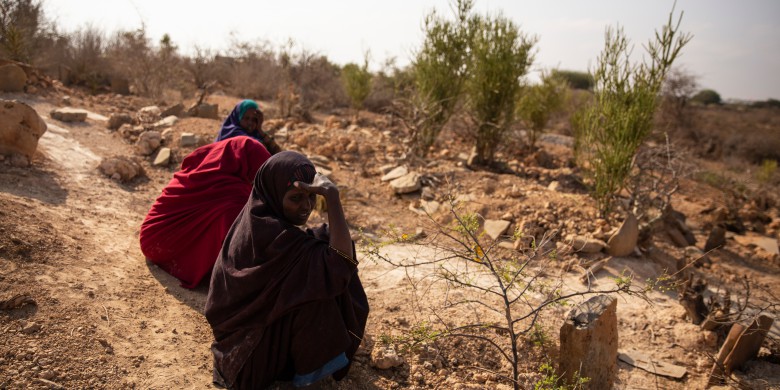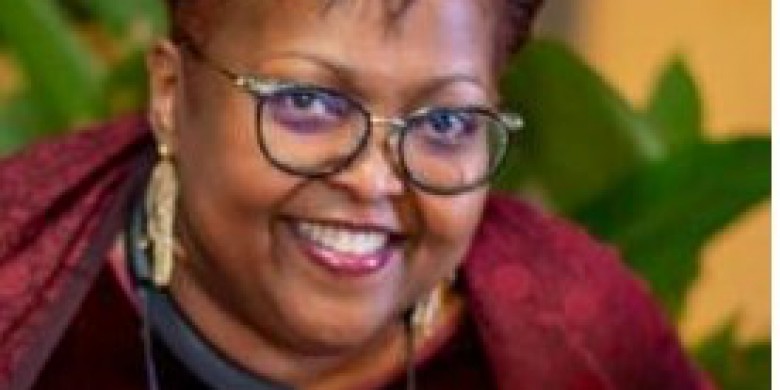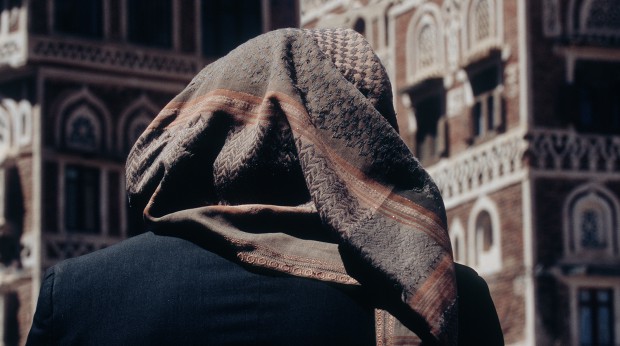
Conflict, Climate Change and COVID-19: The Complexities of Somalia
At times of acute crisis, it is easy to lose sight of the bigger picture. A global pandemic, like the one we are facing today, is a perfect example of where our natural response is to focus solely on the aspects which are most acutely affected: a nation’s healthcare system and its economy. However, the trickle-down effect of COVID-19 can seriously affect other crucial areas of life, particularly peace and conflict.
CSPPS has launched this series of articles, which zooms in on the role of civil society in supporting local response action. Via interviews with frontline responders, we discuss the short-term and long-term effects that COVID-19 is having on prospects for peace and stability in their countries.
“If the coronavirus crisis has shown us one thing, it is that our society is not sustainable. If one single virus can destroy economies in a couple of weeks, it shows we are not thinking long-term and taking risks into account.”
(Greta Thunberg, 22 April 2020, Earth Day)

With COVID-19 sweeping across the globe, the climate crisis seems to partly be losing last year’s hard-won attention. Lockdowns worldwide have led to a significant reduction of greenhouse gas emissions, and the media overwhelms us with images of nature taking over in urban settings. Such false comforts, found in the temporary side effects of the pandemic, do not aid in perpetuating the need for action on the climate emergency in the long run. Nor does it provide the required support for the ones already bearing the brunt of the devastating effects of climate change, global pandemic or not. Somalia is one such country.
Somalia is one of the most vulnerable countries to climate change in the world: droughts and floods have been devastating harvests and has led to the displacement of many people. Last year, one of the driest rainy seasons in over 35 years left almost half of the population without the means to feed themselves or their children. The year 2020 is not looking any better: almost 400,000 children under the age of five are malnourished, and recent floods in several parts of Somalia affected an additional half- million people, only exacerbating the ongoing humanitarian crisis.
Nationwide, over 2.6 million people have been displaced, of which 800,000 have flocked to informal settlements across the capital of Mogadishu, driven away from their rural homes because of the threats of repeated natural disasters as well as violence from its ongoing civil war. After three decades of incessant conflict, Somalia lacks the resilience to take on COVID-19.
For the fourth article in this series (read more here), the Secretariat of the Civil Society Platform for Peacebuilding and Statebuilding (CSPPS) uncovers part of the complexities of the Somali situation, involving ongoing conflict and the climate crisis under an added layer of the corona pandemic. We had the opportunity to speak with Ms. Hibo Yassin, CSPPS Focal Point and Executive Director of IIDA Women’s Development Organization in Somalia, who shared her on-the-ground perspective of the complex Somali situation in light of COVID-19.

“This pandemic, per definition, is global. But humanity will beat it, we are optimistic. However, how will this pan out for the fragile and conflict-affected countries in the long term? It will most certainly have a severe impact. Globally, we have to think strategically about these countries. I can envision a push that reflects the world as being one. As this pandemic has proven that we are all affected because we are interconnected. COVID-19 now overshadows conflicts, insecure livelihoods, and the effects of climate change. But today, more than ever, inequality needs to be fought. A problem in one part of the world is a problem for us all.”
Ms. Yassin emphasises how in Somalia, with so many people that have lost their homes and livelihoods, amidst an ongoing civil war, social distancing is an unobtainable feat. How does one wash their hands, and remain at an acceptable distance, if the camps for the internally displaced are crammed, makeshift shelters with little to no sanitation and with limited access to the most basic services?
Like in many other fragile and conflict-affected countries, COVID-19 is also quickly becoming an issue of human rights, injustice, and gender-based violence. Somali journalists are facing threats, intimidation and violent attacks for their coverage of the pandemic, and as the justice system is frail, human rights abuses can easily spike. Equally so, women will become victims of domestic and sexual abuse even more easily, as they are confined to their homes and are quickly losing their financial independence due to lockdown-related measures.
The shock to Somalia’s fragile economy is exorbitant. “Even with the ongoing conflict, the economy was slowly recovering, and we at IIDA were finally starting to reap the benefits of our work. Now, with this pandemic, people are going out of business again. Markets are closing, excluding any possibility of a daily income. People are now really starting to feel the heat”, Ms. Yassin explains.
“People are working in areas that are very dangerous, people fight over land, both because they lose access to it due to the ongoing civil war, as well as the consequences of the recurrent floods and droughts. They struggle to survive. Particularly, the fight and occupation of al-Shabaab in the area is not helping. We are faced with continuous clashes between this jihadist fundamentalist group, the Somali National Army, and the African Union Mission in Somalia, and too many people are losing their lives. The conflict is still there. We [IIDA] are still doing our work, and this cannot stop. But with even more poverty now coming into those areas, the conflict will only be intensified.”
Yassin and her organisation are helping female small business owners by developing protection measures for the time to come. They also liaise with local authorities, discussing how to handle this ongoing pandemic, bottom-up as well as top-down. The Ministry of Women and Human Rights Development has started distributing food packages for women-led households equivalent to a month’s worth of rations, and IIDA is currently part of a group of women-led CSOs that joined this fundraising initiative to support additional families. The distribution of masks is another priority, especially amongst the most vulnerable and poor, next to their usual peacebuilding and statebuilding efforts. But navigating these many risks and vulnerabilities, within a setting so fragile and complex, is a gargantuan challenge.
“Amidst COVID-19, we have terrorism. We have an ongoing war. And we have a climate crisis. Additionally, the pandemic has precipitated social problems such as land grabbing, sexual abuse, and the misuse of authority. And the situation in the camps of internally displaced people and other informal settlements is also only becoming more dire,’ Ms. Yassin explains. “With people losing their income, the risk of children being recruited to al-Shabaab, in return for a small remuneration, is rising. Al-Shabaab is either blocking the correct information about the pandemic from reaching the communities or claims that it does not exist at all. This only increases this risk.”
Somalia has one of the worst track records worldwide when it comes to grave violations towards children, according to a report of the UN Secretary-General on “Children and armed conflict in Somalia”. Children are abducted, recruited, forcibly married and sexually abused. As al-Shabaab is the main perpetrator regarding these violations, their use of the COVID-19 situation to their own advantage can only be described as catastrophic.
Like a Russian doll, Somalia’s many layers of interlinked crises are revealed in Yassin’s plea, with at its core the unsustainability of our current system. A short-term vision and non-inclusive governance, as well as poor distribution of natural resources can only exacerbate the multiple crises the world faces today. The interlinkages between all facets of life ask for a holistic and long-term vision in order to reach a sustainable and balanced world order. Even in the face of an acute, global health crisis, we cannot forget the other pressing matters that continue to threaten our existence: conflict, climate change, and the persistent inequality within society worldwide. For a sustainable future, where humanity is at peace with itself, as well as our environment, we need fundamental changes. And the forced standstill to our economic and social activities, as we are currently experiencing, could be its awaited catalyst.
“The poorest and most vulnerable in Somalia live from hand-to-mouth: they eat whatever they earn that day. The pandemic, paired with the increased food insecurity due to the consequences of conflict and climate change, with its recent droughts, floods as well as the locust plagues eating the harvests, will only increase the pressure on the low-income families that are already struggling.”
In his address on Earth Day on 22 April, UN Secretary-General António Guterres pointed out how deforestation, illegal wildlife trade, climate change and other anthropogenic alterations to nature affect our habitat and increase the chances of transmission of zoonotic diseases (diseases that are transferable between animals and humans), as has happened with COVID-19. Humanity and its living environment are inextricably interlinked. All at once, “we must act decisively to protect our planet from both the coronavirus and the existential threat of climate disruption.”
Somalia is a perfect example of a country where climate change directly exacerbates conflict and national instability: the increasingly erratic weather, causing flash floods and failed harvests, forces people to seek a source of income or home elsewhere, rendering them vulnerable to trafficking as well as recruitment by militants. Even more simply put, in times of hunger, fights over basic resources erupt more frequently as well as more violently. The world’s current economic system and consumptive behaviour patterns have slowly, but steadily begun to disrupt the lives of the most vulnerable. And it will not stop there, if we do not change our ways. The response to COVID-19, when placed in the bigger picture of a peaceful and resilient world, therefore needs to go hand in hand with environmental action.
“With this restart, a window of hope and opportunity opens… An opportunity for nations to green their recovery packages and shape the 21st century economy in ways that are clean, green, healthy, safe and more resilient.”
(UN Climate Chief)
On the 22nd of April 2020, the 50th anniversary of Earth Day was paid tribute to by the UN Security Council during an online Arria formula meeting, discussing the undeniable links and similarities between the climate crisis and COVID-19. “Without quick global collective action, climate change could well prove to be the slow-motion version of the coronavirus outbreak, reshaping economic, political and security conditions around the world in negative ways,” said Robert Malley. Just like COVID-19, climate change has the potential to push societies, that are already on the brink of collapse, entirely over the edge.
Ms. Yassin believes firmly that the only sustainable way out of this pandemic is one where we think in terms of ‘we’ rather than just as ‘I’. She points out the issues with our current approach to each other as human beings as well as our shared natural resources. However, more importantly, she indicates that the current pandemic reflects how we are all in the same boat, and that this moment is therefore a small window of opportunity for true systemic change. But, in order for that opportunity to be seized, ‘the discussion needs to come back on how to deal with fragility, on how to handle peacebuilding issues and inequality, and on how to uphold human rights. This is also an opportunity for civil society organisations and all other actors, including the government, to join hands and collectively strategize on a response. All stakeholders need to synergise their efforts to continue the work on human rights, social protection and peacebuilding. These matters need to be on the table, especially when we discuss COVID-19”, Ms. Yassin says, highlighting how, just like climate change, COVID-19 is a global issue, which touches upon all aspects of life.
Like Yassin, the young climate activist Greta Thunberg recognises the importance of this opportunity, and also the hesitations and fears that the unknown may bring. But, “in a crisis you put your differences aside, you act, you go out into the unknown and take decisions that may not make much sense at the moment, but in the long run may be necessary for our common wellbeing. Whether we like it or not, the world has changed: it looks completely different from how it did a few months ago and it will probably not look the same again and we are going to have to choose a new way forward”, Thunberg said at a virtual meeting marking the 50th anniversary of Earth Day.
The Civil Society Platform for Peacebuilding and Statebuilding stands together, with all of these voices. With our own Hibo Yassin, who works tirelessly for a more resilient Somalia, amidst all of its complexities. With the United Nations, urging governments to recover in a better, greener and more inclusive way. With Greta Thunberg, who believes that climate change needs to end in climate justice worldwide. And especially, with the vulnerable communities of Somalia, and all other communities in fragile and conflict-affected countries, in a plea for a united, resilient and peaceful world where we leave no one behind. Not our people, nor our planet.
Article by Charlotte de Harder - CSPPS

